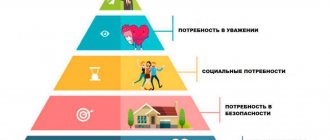Man is a socio-biological being, and accordingly, needs have different natures, or rather levels. Needs determine the motives and activities of an individual. This is the fundamental basis of human life as an individual, personality and individuality. From the article you will learn what needs are and what their differences are, how they develop, what they depend on and what depends on them.
What are needs?
Needs are a person’s perceived need for something, something that is necessary for him to maintain the vital functions of the body and the development of his personality. In my opinion, this is a fairly simple and easy to remember definition.
However, not all needs benefit a person. Therefore, from the point of view of necessity and benefit, the needs are:
- genuine (reasonable, true) are the needs without which a person either simply cannot live (food, housing, society, because it is among people that he becomes a person), or are necessary for his improvement and development (spiritual).
- False (unreasonable, imaginary) are needs without which it is not only possible, but also necessary to live; they lead to the destruction of personality, and a person degrades both physically and mentally (alcoholism, drug addiction, parasitism)
The Nature of Human Desires
In a broad sense, needs are defined as a source of activity and a form of communication between a living organism and the outside world.
Human social needs are the desires and aspirations inherent in the individual as a representative of the human race.
Humanity is a social system, without which personal development is impossible. A person is always part of a community of people. By fulfilling social aspirations and desires, he develops and manifests himself as a personality.
Belonging to a human society determines the emergence of human social needs. They are experienced as desires, drives, aspirations, brightly colored emotionally. They form the motives of activity and determine the direction of behavior, replacing each other as some desires are realized and others are actualized.
Biological desires and nature of people are expressed in the need to maintain vital activity and the optimal level of functioning of the body. This is achieved by satisfying a need for something. People, like animals, have a special form of satisfying all types of biological needs - unconscious instincts.
The question of the nature of needs remains controversial in the scientific community. Some scientists reject the social nature of desires and drives, while others ignore the biological basis.
Types of needs
There are several classifications of needs. According to the most common types of needs, the following types of needs are distinguished:
| Types of needs | Examples |
| biological, that is, natural, innate, natural | food, air, sleep, reproduction, etc. |
| material | housing, clothing, jewelry, etc. |
| social | communication, society's assessment of human activity, labor. |
| spiritual (cognitive, cultural, ideal) | teaching, formation of a worldview, knowledge of the world, society and oneself, search for an ideal, the meaning of life, moral values, etc. |
American psychologist A. Maslow built needs in the form of a kind of pyramid: the closer the need is to the base of the pyramid, the more necessary it is. All subsequent ones are needed when the previous ones are satisfied.
Needs and motives of the individual
The main condition for the life of organisms is the presence of their activity. In animals, activity manifests itself in instincts. But human behavior is much more complex and is determined by the presence of two factors: regulatory and incentive, i.e. motives and needs.
The motives and system of needs of the individual have their own main characteristics. If need is need (scarcity), the need for something and the need to eliminate something that is in abundance, then the motive is a pusher. Those. need creates a state of activity, and motive gives it direction, pushes activity in the required direction. Necessity or necessity, first of all, is felt by a person as a state of tension inside, or manifests itself as thoughts, dreams. This encourages the individual to search for an item of need, but does not give direction to the activity to satisfy it.
Motive, in turn, is an incentive to achieve the desired or, conversely, to avoid it, to carry out an activity or not. Motives can be accompanied by positive or negative emotions. Satisfying needs always leads to a release of tension; the need disappears, but after a while it can arise again. With motives, the opposite is true. The stated goal and the immediate motive do not coincide. Because a goal is where or what a person strives for, and a motive is the reason why he strives.
You can set a goal for yourself following different motives. But an option is also possible in which the motive shifts to the goal. This means transforming the motive of activity directly into a motive. For example, a student initially learns his homework because his parents force him to, but then interest awakens and he begins to study for the sake of learning itself. Those. It turns out that a motive is an internal psychological motivator of behavior or actions, which is stable and encourages an individual to carry out activities, giving it meaning. And need is an internal state of feeling need, which expresses the dependence of a person or animals on certain conditions of existence.
Pyramid of needs Maslow A.H.
Primary needs.
- Physiological (satisfaction of natural instincts, these are: thirst, hunger, rest, reproduction, breathing, clothing, housing, physical activity)
- Existential (from Latin existence, this is the need for protection, security, confidence in the future, insurance, comfort, job security)
Secondary needs.
- Social (the need to live in society, to belong to a certain social group: communication, affection, attention to oneself, caring for others, participation in joint activities)
- Prestigious (the need for respect, recognition, career growth. It is no coincidence that A. Maslow singled out prestigious as a special type of needs, since the opinion of society and others is very important to a person. Any praise is pleasant to people, there is a desire to do something even better.
- Spiritual (self-expression, self-realization through creativity, knowledge, teaching, self-affirmation, etc.)
Human needs have a number of features:
- all needs are interconnected
- it is impossible to satisfy all needs
- limitlessness of needs
- needs should not contradict the moral principles of society.
A person changes - some of his needs become different. Even in a single society, at a certain stage of development, there may be its own needs. Needs are determined by both the natural and social essence of a person.
Yes, human activity and actions are driven by the desire to satisfy their needs. It is important to set priorities for yourself, to clearly know what a person wants and why he needs it. And we must not forget that a person’s needs are limitless; it will not be enough to satisfy everything 100% throughout one’s life. So the choice depends on everyone, on the level of his upbringing, development, on the environment in which he lives, on those values that are important for his environment. It is important that the needs are genuine, guys, do not allow imaginary needs to take over your soul and consciousness. Live enjoying life, giving joy to your loved ones.
Material prepared by: Melnikova Vera Aleksandrovna
Afterword
Satisfying needs is important for adequate personality development. If biological needs are ignored, a person can get sick and die, and if higher needs are unsatisfied, neuroses develop, intrapersonal conflicts and other psychological problems arise.
It is worth noting that there are exceptions to the rule “first satisfying some needs - then developing others.” We are talking about creators and warriors who can set higher goals, despite unmet physical needs, such as hunger and lack of sleep. But for the average person the following data is typical:
- physiological needs are satisfied by 85%;
- in safety and security – by 70%;
- in love and belonging – by 50%;
- in self-esteem – by 40%;
- in self-actualization – by 10%.
Needs are closely related to the social situation of human development and the level of socialization. Interestingly, this connection is interdependent.
Needs and interests of the individual
The category of need is inextricably linked with the category of interests. The origin of interests is always based on needs. Interest is an expression of an individual’s purposeful attitude towards some type of his needs.
A person’s interest is not so much directed specifically at the subject of need, but rather directed at such social factors that make this subject more accessible, mainly the various benefits of civilization (material or spiritual), which ensure the satisfaction of such needs. Interests are also determined by the specific position of people in society, the position of social groups and are the most powerful incentives for any activity.
Interests can also be classified depending on the focus or the carrier of these interests. The first group includes social, spiritual and political interests. The second includes the interests of society as a whole, group and individual interests.
The interests of an individual express his orientation, which largely determines his path and the nature of any activity.
In its general manifestation, interest can be called the true reason for social and personal actions, events, which stands directly behind the motives of individuals taking part in these very actions. Interest can be objective and objective social, conscious, realizable.
The objectively effective and optimal way to satisfy needs is called objective interest. Such interest is of an objective nature and does not depend on the consciousness of the individual.
An objectively effective and optimal way to satisfy needs in public space is called objective social interest. For example, there are a lot of stalls and shops in the market and there is definitely an optimal path to the best and cheapest product. This will be a manifestation of objective social interest. There are many ways to make various purchases, but among them there will definitely be one that is objectively optimal for a particular situation.
The subject's ideas about how best to satisfy his needs are called conscious interest. Such interest may coincide with the objective one or be slightly different, or may have a completely opposite direction. The immediate cause of almost all actions of subjects is precisely the interest of a conscious nature. Such interest is based on a person’s personal experience. The path that a person takes to satisfy the needs of the individual is called realized interest. It can completely coincide with the interest of a conscious nature, or absolutely contradict it.
There is another type of interest - this is a product. This variety represents both the path to satisfying needs and the way to satisfy them. A product may be the optimal way to satisfy a need and may appear to be so.
Signs of successful fulfillment of needs
A person is successful in achieving his goals if he sets them correctly, motivates himself correctly and selects the necessary means of solution. In addition, of course, third-party factors that interfere with the subject may influence, but their likelihood is lower than the degree of personal effort.
A person’s self-confidence will also directly affect the results of his activities. Timely satisfied needs help him in successful activities.
According to Maslow, the highest aspiration of any person is self-actualization. This is what we all ideally strive for. Here are the personality traits that have achieved maximum success, overcoming all their desires:
- Love for yourself and others, harmony with yourself and nature
- High degree of concentration and composure when solving a problem
- Interest in social interaction
- Objectivity of perception, openness to new opinions
- Spontaneity of emotions, naturalness in behavior
- Recognizing your individuality
- Tolerance towards other people, cultures, phenomena
- Independence from public opinion, the ability to express one’s point of view
- The ability to love, be friends - experience deep feelings
- A never-ending desire for knowledge
- Creative thinking
- Wit (not ridiculing the shortcomings of others, but leaving oneself and others the right to make mistakes)
Thus, we examined the types of human needs and various approaches to this issue. Any person striving for excellence must be aware of his needs and their origin in order to weed out the unnecessary and concentrate on what is really important. Then your life will be filled with meaning and bring you pleasure.











